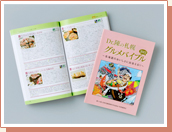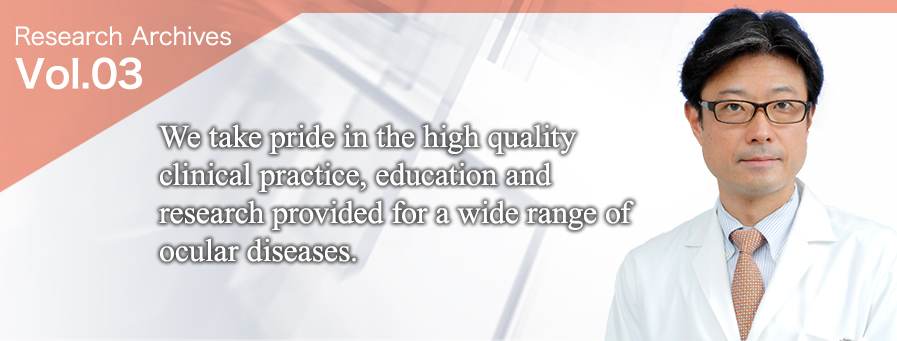
Department of Ophthalmology, Graduate School of Medicine, Hokkaido University
Susumu Ishida, M.D., Ph.D.Specialized
Medicine
- 1990: Graduated from School of Medicine, Keio University, and became an intern doctor, Department of Ophthalmology of Keio University Hospital
- 1994: Chief of Department of Ophthalmology, Sanokousei General Hospital
- 1995: Research Associate of Ophthalmology, School of Medicine, Keio University
- 2001: Researcher of Ophthalmology, Harvard University
- 2004: Lecturer, Department of Ophthalmology, School of Medicine, Keio University
- 2009 – Present: Professor, Department of Ophthalmology, Hokkaido University Graduate School of Medicine after assignment as chief of the Retinal Cell Biology lab, and an Associate Professor, School of Medicine, Keio University
Covering all functions and diseases of delicate and complex eyes, we are engaged in wide range of highly advanced research.
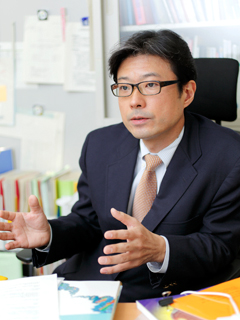
Since Professor Susumu Ishida assumed his post at the Department of Ophthalmology of Hokkaido University Graduate School of Medicine in 2009, our laboratory has been leading ophthalmic medicine in Hokkaido in all areas ranging from clinical practice to education and research.
"The human eyeball is about 24 ㎜ in diameter, full of delicate parts including the cornea, lens, uvea, retina and optic nerves, and it is compared to a separate microcosm. One feature of our laboratory is its research environment that allows us to study all parts of the eye in depth. We have developed a research system comprising leading specialists of lifestyle related diseases including glaucoma, diabetic retinopathy, and age-related macular degeneration (AMD), all listed among the leading causes of loss of eyesight in Japan."
The Department of Ophthalmology has five research groups: Ocular Immunology, Retinal Cell Biology (Vascular Research), Retinal Cell Biology (Neuronal Research), Ocular Oncology and Pathology, and Corneal Cell Biology. Professor Ishida is also involved in the development of (Pro)renin Receptor inhibitors, which is in the upper stream of the Renin-Angiotensin System (RAS) by conducting research into diabetic retinopathy and RAS. Researchers from other fields including pharmacology have also participated in the development of medications, and conducted studies of a wide range of opthalmologic topics.
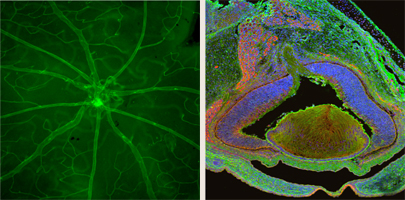
Right: Multi-dyed specimen of (Pro)renin Receptors (red), β-Catenin (green), and the nucleus (blue) of a mouse embryo retina
"Ocular Oncology and Pathology is a research field unique to Hokkaido University. Cases of eye tumors are relatively few and only few other universities focus on eye tumors as an independent research theme. Therefore, many patients with eye tumors visit and also are referred to Hokkaido University Hospital, where researchers conduct research into a wide range of ailments including very rare cases. This focus on eye tumors is another feature of the Department of Ophthalmology of Hokkaido University."
In addition, it is noteworthy that each of the three activities, clinical practice, education and research has achieved outstanding results.
"Hokkaido University Hospital takes pride in serving as a medical 'final frontier' in Hokkaido. For this reason, we place importance on enriching and elaborating all aspects involved, an indispensable quality to improve the level of research and education and maintain the highest level of medical care. The Department of Ophthalmology pursues each sector of the broad research area in depth, while ensuring mutual feedback among the clinical, education and research areas."
Education for graduates to support progress of medicine and improve levels of medical care
Enthusiastic instruction by all faculty and superiors
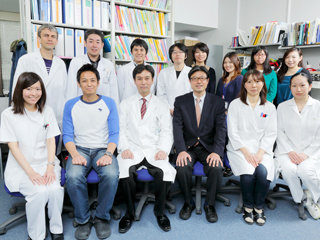
The level of the graduate school education is also highly acclaimed across all of the campus. During the recent few years young researchers have been actively contributing and publishing more than 30 papers a year, and also winning numerous scientific prizes.
"It is possible for us to acquire the techniques needed in medical care through practical work in municipal hospitals, but the research necessary to support progress of medicine and the level of medical care is only possible through the education at graduate schools. This is why we provide education at the graduate school to be able to fulfill these goals that stand as our ultimate mission."
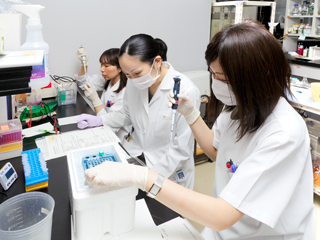 Many students we welcome here at the graduate school are ophthalmologists with a rich and extensive experience of operations who have spent years as clinicians.
Many students we welcome here at the graduate school are ophthalmologists with a rich and extensive experience of operations who have spent years as clinicians.
"We recommend students to enter the graduate school with awareness of the problems of present day ophthalmic medicine, what it lacks and what diseases are incurable, though the clinical experience as clinicians. This is because students would be more deeply engaged in research with an awareness of the issues, and have aspirations to contribute research results to the progress of medical care. I call this the 'ladder theory' because the activity of graduate school students writing papers is similar to climbing a ladder. We can gain wonderful results only after climbing up a long and steep ladder, and write papers that have an impact on the world. As educators, it is important that we have a quality ladder at an appropriate place. We are also striving to improve research arrangements including facilities and research funding so that graduates can be engaged in all the research they can possibly wish."
(Interviewed in November 2013)
Excellent people with a range of talents who do their best in work and play
Many of the department staff have a variety of talents and we value our interests and hobbies such as cuisine, sports and so on. Professor Ishida loves tennis, some have written a gourmet guidebook to introduce restaurants where they tried out the food, and others draw comic books as well as some are highly professional cartoonists. We organize many events, such as baseball or football games, and year-end parties, and these opportunities refresh us and improve communication among members.
